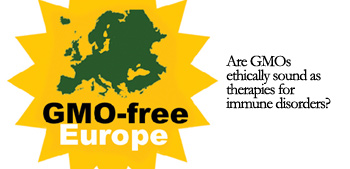 |
| economics | bioethics | |
 | |
|
Section Navigation
» sociocultural impact:
» economics:
» bioethics:
|
|
← back bioethicsPoints of view:Although there are those who argue that genetically-modified proteins are a hubristic manipulation of evolution, the fact is that governments have already adopted them generally. Perhaps plant-made antibodies have not been exactly marketed yet in this theoretical country 'x', but perhaps GMO foods have. When a government body makes a decision regarding a industry, the considerations are primarily utilitarian. A utilitarian would argue that one must always act so far as to maximise pleasure and minimise pain, where pain is a negative consequence and pleasure is obviously a positive consequence. One of the main purposes in introducing genetically modified plant into an ecosystem is to create humanised non-vaccine compounds to battle diseases. Under premise of the utilitarian argument, it is important that we consider who might be set to benefit, and how much they would benefit, and similarly, who will be at a disadvantage. Simply put, an analysis of the economics of the investment into genetically modified plants appears to provide more pleasure than pain. The population of country 'x' would stand to benefit the most, economically of course. The genetically modified plant would likely create a huge investment into the country, sparking an improvement of the infrastructure, healthcare and overall standard of living. For those who object to GMOs in general on another level, there are measures that other well-developed countries have taken to ensure their concerns are met. Safety trials are a must. Labelling GMO proteins can also be a measure against treading on a person's beliefs through forced ignorance. Consider the individuals plagued by an immune disease, who stand to gain from the investment. Sufferers of rheumatoid arthritis, will recover mobility in their joints, and have reduced inflammation. The continued application of drugs that merely treat the symptoms will be able to come to an end. Patients infected with diabetes may no longer have to continually and tediously, monitor their blood glucose levels, and will be able to live a normal life without the fear of a diabetic coma and/or hyperglycaemic death. Similarly, patients infected with HIV who undergo HAART to halt the replication of the virus, and who then subsequently suffer from modifications to their CD4+ cells, will be able to undergo treatment without developing overwhelming side-effects. Or, perhaps a complete alternative to HAART might be found, along with edible prophylactics and therapies. Clearly, the possibilities are vast.
 This image shows the logo of GMO Free Europe. Do their opinions hold for recombinant proteins for medicinal use? Does the end justify the means? The negative ethical response to genetically modified plants can be framed into the question, 'does the end justify the means?' Simply put, the modification of the genetic make-up of a plant that might be used for humans could have devastating effects on other aspects of life. The genetically modified plants may also have a selective advantage over plants in the surrounding ecosystem, which could lead their becoming an invasive species that is able to absorb and thus destroy many different ecological niches at once. This may lead to a reduction in the biodiversity of the surrounding ecosystem, and burden the plants, animals and people who may depend on these plants and animals for survival. Response and Conclusion It is unlikely that a genetically modified plant would be harvested without a very detailed and penetrating analysis of the proteins, and the selective advantage that might be created as a result. Safety will always be an issue that is addressed first. Further, the very definite benefits greatly outweigh the less probable, potential negative effects. In conclusion, it can be argued that it is ethically sound to introduce the genetically modified plant into country 'x' provided that the products of the plant were designated for people with an immune disease, as is suggested. In essence, ethical concerns are not new to the advent of plant-made therapies, but have been present since the popularisation of GMOs as a whole. However, the utilitarian benefits and increased quality of life for all those affected, surpasses many potential detriments that might be created as a result of the implementation of genetically modified plants into the agricultural sector of the state.
|